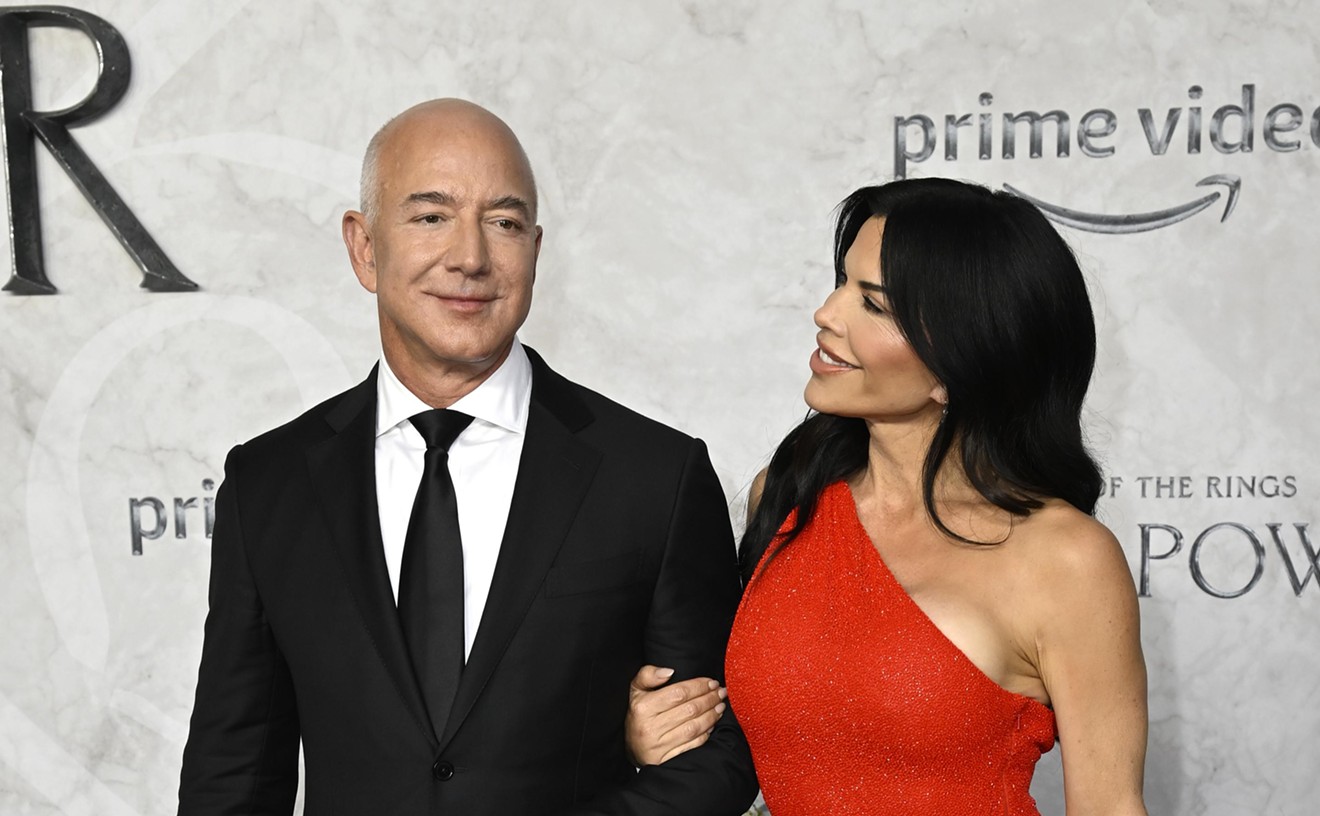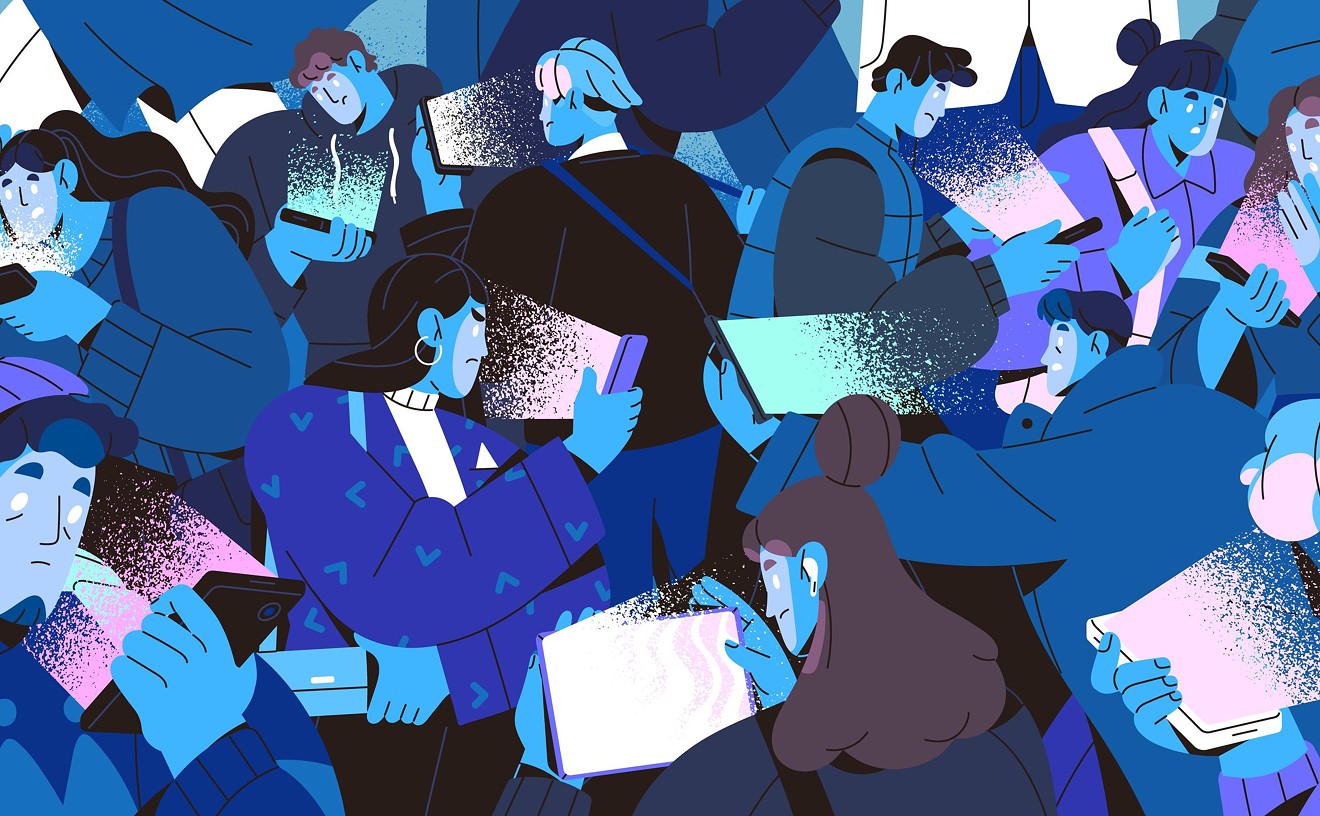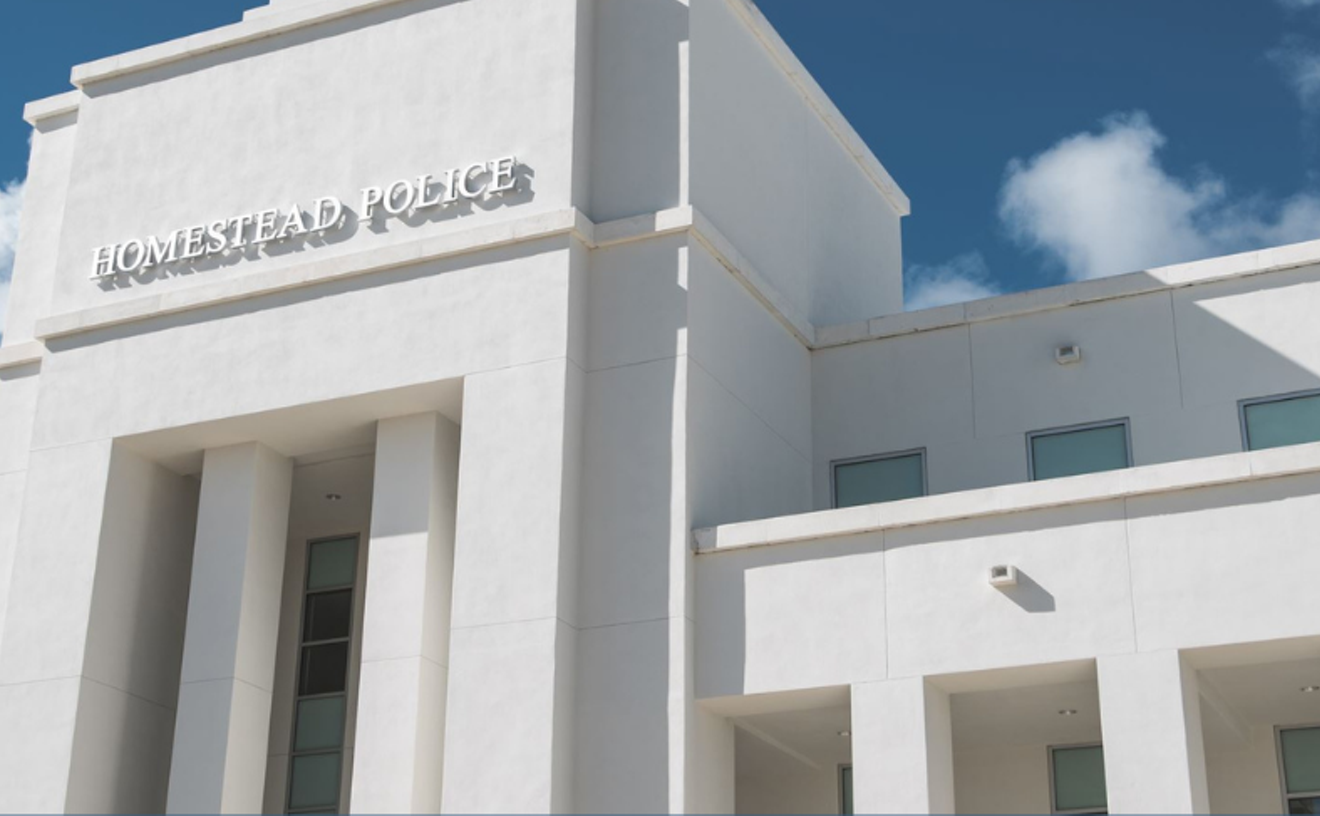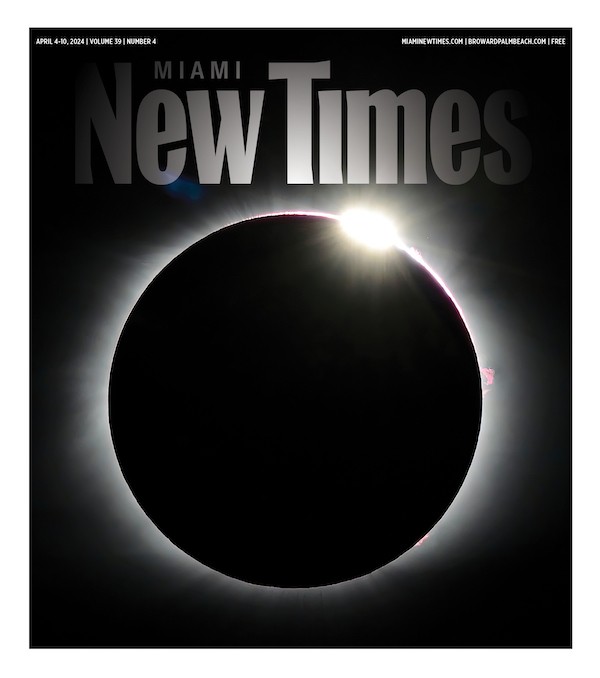Rodgrick Girtman is a handsome, cherub-faced kid with "Neisha" tattooed on the right side of his neck. It was a profession of love for his two infant sons' 19-year-old mother, Corneisha Miller. But Rodgrick wasn't the ideal boyfriend. On April 23 last year, he was arrested for allegedly punching her in the face. State prosecutors dropped the charge after Corneisha refused to cooperate.
Eleven months later, Rodgrick's temper apparently got the best of him again. On the morning of March 18, people in the neighborhood claimed they saw him brandishing a pistol. He said he was going to kill Corneisha, her family, and her friends.
Shortly before noon, a gunshot echoed through the couple's single-story beige house at Northwest 68th Street and 15th Avenue. Corneisha, Rodgrick, and their sons were in the bedroom.
The sound startled Corneisha's brother Marcus, who was standing on the front porch. He burst into the room. Rodgrick was kneeling next to Corneisha, holding a towel against her neck in an attempt to stop the blood gushing from a bullet hole in her throat.
Marcus grabbed the children and ran outside. He called 911. "The baby daddy shot my sister," he shouted.
Within minutes, Miami Police officers surrounded the home. The boys were taken to a neighbor's house. Paramedics transported their mother to Ryder Trauma Center, where she was pronounced dead.
In the bedroom, detectives quickly found a pistol that witnesses said belonged to Rodgrick. Later that day, he confessed and was charged with first-degree murder.
Corneisha, who was laid to rest this past March 27, was at least the ninth person killed since 2005 on a three-block stretch of NW 15th Avenue in Liberty City. All but one were under age 30. Four, including Corneisha, were teenagers.
But it's not just murder that defines the area. Outlaws of every stripe have turned up here. The John Doe Gang ran its vast crack and powder cocaine empire with murderous efficiency during the '90s. In a warehouse on the stretch, six accused terrorists allegedly plotted to blow up Chicago's Sears Tower. And just last year, two assault rifle-wielding attackers mowed down nine people, killing two teenagers.
The street is also home to some of the most established black-owned businesses in Miami and the oldest public housing project in Florida. Miami rappers Trick Daddy and Trina were born and raised on 15th Avenue. Music impresario Luther Campbell threw block parties here for decades, and local rappers such as Rick Ross and reality television shows have used the neighborhood as a backdrop.
Dwight Manley, who goes by the nickname Krow, has seen it all. The tall, lanky fellow moved to 15th Avenue from Brownsville as a kid 25 years ago. With a natty beard and long dreadlocks snaking down the back of his orange T-shirt, he sits on the first-floor step of a five-story apartment building at NW 70th Street and 15th Avenue reading the morning's Miami Herald. Two friends share a blunt nearby while teenage boys play in the desolate courtyard.
Though many residents in the neighborhood are suspicious of outsiders, Krow is at ease. In a casual, deep baritone, he talks about the writings of Marcus Garvey and Malcolm X. Then he nonchalantly recounts seeing at least 30 corpses since moving to 15th Avenue in 1985.
"The media and reality shows like The First 48 have helped make this place notorious," Krow says. "You go on Facebook or MySpace, and all people want to ask you about is 15th Avenue and its notoriety. But it ain't all ugly."
Across the street from the apartment building where Krow hangs out, a heavyset black man with a gray flattop sits on a stool behind the counter of Brewton's Market. Clarence Brewton has inhabited this spot since opening the place 37 years ago. Mr. C., as residents call him, is there every morning. His wife, Jacqueline, takes over the counter in the afternoon. The couple works seven days a week and splits 18-hour days. He's 65 years old. "I'm too old to go anywhere else," he jests. "I work a lot of long hours to make a small amount of money. But I like serving the community and the people. This is a place that will always be here."
Foot traffic is slow. Only three customers enter his store during a recent 45-minute span. A blind man comes in and pays for additional minutes on a prepaid cell phone. A hunched-over elderly man pushing a wheeled walker buys a carton of orange juice. Wearing an oversize T-shirt and spandex shorts, a woman with ample thighs purchases a couple of 16-ounce cans of beer for $1.50 a pop.
During long lulls, Clarence explains that 15th Avenue was alive with people back when he bought the store. Women would go to the Glamourama Beauty Salon down on 69th Street to get their hair done for $3. People would flock to see black entertainers at the Cotton Club on 68th Street. "We had a little bit of everything," he says. "There used to be a lot of jobs in the neighborhood. Not anymore."
The Claxton, Georgia native came to Miami in 1963. He soon landed a job as a maintenance worker at the Fontainebleau in Miami Beach. Three years later, he took a gig fixing car bumpers at an auto body shop near Overtown. Around the same time, he met Jacqueline, then a 17-year-old girl who lived with her family in a wood-frame house on 67th Street. The two fell in love and married in 1967.
Five years later, the couple decided to open a business. "My wife's uncle had a grocery store," he says. "She had worked there, so she had the knowledge." They came across an empty storefront at 7002 NW 15th Ave. "It had been closed for years," he recalls. "The old lady who owned it lived upstairs. She rented the space to us for $270 a month. My wife and I lived our lives in here. We still do."
The Brewtons had hoped their oldest son, Robert, would take over the family business. But he was killed four days before graduating with a degree in business administration from Bethune Cookman University in Daytona Beach 18 years ago. Clarence doesn't like to talk about how his son died. "The plan was to let him take over the family business," he says. The couple has one other child, a daughter who was a juvenile corrections officer before going to work for the FBI.
During the '80s, life on 15th Avenue took a turn for the worse. First in 1980 and then repeatedly during the decade, rage over poverty and prejudice set off civil disturbances. "After the riots, it didn't get any better," he says. Looters never touched the store. "I was open," he says. "I didn't get any problems."
Clarence knows scores of neighborhood people on a first-name basis. "I've never had any issues with them," he says. "No one has ever given me or my wife any trouble." Most of the people who lived here when the store opened have either moved away or died. "We have this new generation," he says. "These young people don't care about the community."
Too often, police officers mess with the wrong people. "They focus more on the folks drinking a beer on the corner than anyone else," he says. And there's a lack of political leadership. Since Athalie Range, a funeral home owner who became the city's first black commissioner in 1966, left the dais, criminals and incompetents have represented the area. "Ms. Range always tried to look out for the community," Clarence says. "Right now, we don't have anyone standing up for us."
Slide down the block, past the shuttered laundromat with black iron bars on blown-out windows, and you'll usually find Thomas Carr reclining against the torn blue leather seat of his gray GMC truck. It's parked in the lot of his food joint, Miracles Fry Conchfritter, at 7070 NW 15th Ave. The long, leafy branches of a tree planted on the property next door shield Carr from the scorching sunlight on a muggy May afternoon. He's dressed in a white V-neck tee, gray jeans, sandals, and tortoise shell eyeglasses.
Customers sporadically walk up to the counter of the boxy blue building to order chicken wings, burgers, and the most succulent conch fritters this side of the Bahamas. "I called this place Miracles because it was a miracle that I got it going," he says. "And it is a miracle that I've been able to stay here."
The structure was built in 1957 and started off as a Dairy Queen. No one knows when the ice-cream spot went out of business, but Carr remembers first noticing the building sometime in 1973. Back then, he was a City of Miami solid waste worker who sold fried conch in Liberty City from the back of his truck during free time. "I'd pull up in front of the building," he says. "Then I tracked down the owner and finally rented it."
At the time, Thomas and his wife would arrive before 6 a.m. She'd clean the floors and the kitchen equipment while he bought provisions. Thieves twice broke in to steal food. Ever since, he has limited purchases to one day's worth. Neighborhood kids call him Mr. Fritter.
Both of his children, Edwin and Gloria, have worked there, as well as other relatives. "Miracles gave our kids and their cousins a place to go to where they could earn an honest living until they finished school," Carr recalls.
Eight years ago, he bought the building for $20,000. He says if he had the money and crime were reduced, he'd repave the parking lot, add more green space, and remove the metal bars from the door and walk-up counter.
But business has dropped by more than 40 percent over the past decade as costs have risen. Thirty years ago, he bought conch at $4 per pound. Today, the price has doubled. "I can't afford to close or relocate," he says. "Just to get another business off the ground, you have to invest at least $300,000."
So he remains on 15th Avenue, where his place is a beacon for rappers like Rick Ross, who have filmed videos there. Sometimes kids who have gone off to the military return for a visit. Cheap food draws everyone. "One dollar for a conch fritter ain't bad," Carr says. "You can get chicken wings, French fries, and a soda for $5. You can't beat that."
It's June 9, and Krow, the loquacious 34-year-old Marcus Garvey and Malcolm X fan, steps into the front yard of a dark-green house with a covered front porch at NW 70th Street and 15th Avenue. Dressed in baggy black jeans, a black T-shirt, and a black patent leather baseball cap, he passes flowery bushes and two tall palm trees. His black LeBron James Nikes squeak as he crosses the terrazzo floor, opens the front door, and enters the tiled living room of his parents' comfy two-bedroom abode.
His mother, Doris Manley, sits in a swivel chair watching a rerun of Bonanza on TV Land. A mulatto woman in an oversize white T-shirt, shorts, and sandals, she works as a nursing assistant at the VA hospital in Allapattah. Drawn shades and curtains dim the air-conditioned room. Doris has faced the dilemma of many 15th Avenue mothers: How to keep your children from getting sucked into the drugs and violence that so often leads to death?
She has succeeded, in part. Two daughters garnered high grades in school and exited the neighborhood. But a pair of sons, including Krow, has been drawn into the world of drugs and violence. "I've seen a lot of bad stuff," she says. "But there are a lot of good, hard-working people in the neighborhood."
Doris and her husband, Jimmy, moved to Miami from Georgia in 1974. "There were no jobs where we come from," she explains. She found work pressing garments at Dorissa, a now-defunct dress factory in midtown. "I worked there on and off for 15 years," she says. "I started off at $2 an hour." Jimmy was hired at a Coca-Cola plant on Douglas Road.
Later, Doris studied to become a nursing assistant and then secured work at a Barry University-area nursing home for 12 years. She's been at the VA since 2003. "We've never been on welfare or used food stamps," Doris says proudly. "I worked a lot of 16-hour days so the kids could wear Nike gear."
Those kids include adult daughter, Dimetria, who is now an executive for Bank of America. Then came Krow, who was born June 12, 1976. Jimmy Jr. arrived two years later. "We moved to Brownsville in 1980 and stayed there for about five years," Doris says. The youngest child, Amber, was born in 1993. She recently graduated with honors from Miami Northwestern Senior High. The walls of the house are adorned with photos of the brood. One shows Doris and Jimmy with the four children in their arms. "That's when I was young and sexy," she jokes.
Dimetria's and Amber's academic trophies fill a bookshelf holding other family mementos. "My parents taught my sisters that they don't have to settle for any dude or rely on a man to pay their bills," Krow boasts. "They can take care of themselves."
The body count on 15th Avenue rose during the family's early years here. On February 20, 1983, 45-year-old Edward Lee Griffin shot and killed 15-year-old Robert Jackson at the corner of 70th Street. Thirty-five days later, 23-year-old Paul Jackson (no relation to Robert) was murdered on 67th Street. On August 13 that year, 37-year-old Randolph Mitchell collapsed and died behind a restaurant a block from where Paul expired. He had run from a nearby abandoned house where he had been shot. On January 10, 1984, police found the body of 20-year-old Rose Bailey, who had been beaten to death in an abandoned apartment on 64th Street.
The murders played out during Miami's cocaine cowboys era, when the city led the nation in homicides for consecutive years, and the medical examiner's morgue became so crowded that the county had to lease a refrigerated trailer from Burger King for all the cadavers.
Violence arrived the very day the Manleys moved into their first home on 15th Avenue, a four-bedroom apartment on the corner of 65th Street. It was Thanksgiving 1985. "The night we got here, somebody got killed," Doris remembers. "Initially, I didn't want to live out here." Krow remembers he and his siblings walked over to the crime scene and saw the corpse. "After that, I saw bodies lying in the street all the time," he recalls blithely. "They'd be all swollen and in full rigor mortis long after the cops and the coroners had investigated the crime scene."
On September 25, 1990, Jimmy and Doris purchased their current residence, located five blocks up 15th Avenue from their first, for $50,000. The single-story, two-bedroom house was built in 1946. "It has withstood a lot of hurricane weather," Doris says.
To keep their children away from the violence, Doris and Jimmy bought a portable basketball hoop for the back yard. "That net kept me and a lot of my friends off the streets," Krow says. "My parents taught us by example. They were never out drinking or doing drugs. They came home from work and that was it." Cussing wasn't allowed. "Even today, I don't use profanity in this house," Krow insists.
The '90s saw the brutality on 15th Avenue reach a terrifying crescendo. As the cocaine cowboys faded from the scene, the dope boys took their place. Groups such as Vonda's Gang, the Boobie Boys, and Cloud Nine emerged to do battle for prized turf in Liberty City and Overtown. One day in December 1998, at NW 68th Street and 15th Avenue, a suspected gang member was ambushed by rivals in front of a now-closed variety store. More than 50 fist-sized bullet holes riddled the outside walls, according to the Miami Herald. At a church a block north, the pastor stopped services so none of his parishioners would fall victim to stray bullets.
The John Doe Gang, perhaps the most notorious of the inner-city drug rings, operated dope holes along NW 14th and 15th avenues around the same time. They sold weed, powder cocaine, and crack around the clock until 1999, when a Miami federal jury convicted leader Corey Smith and five of his top lieutenants in a wide-ranging drug conspiracy case. One witness claimed the gang had murdered 41 people.
Back then, Krow was a teenager. He somehow steered clear of the John Does and other drug-dealing gangs. But he wasn't motivated to leave 15th Avenue like his older sister, Dimetria. Krow admits he was never interested in scholastic achievement. "I didn't apply myself," he says. His taste in philosophy and music is telling, though. "When I was 16, I checked out Wilson Jeremiah Moses's Classical Black Nationalism from Miami Northwestern's library," he says. "That's when I started turning militant. My favorite person is probably Malcolm X... I like listening to Jay-Z, Nas, and Wu-Tang Clan — none of that Young Jeezy for me. I mean, how many times can you rap to me about how many ounces in a kilo?"
In 1992, during his senior year at Northwestern High, he began work as a clerk at the Miami-Dade County Property Appraiser's office, where he stayed five years. After losing his job in 1997, he landed in trouble. Between 1999 and 2007, he was arrested ten times on criminal charges ranging from loitering to selling small amounts of marijuana and cocaine. He was convicted seven times, though he was never in jail for an extended period of time.
His brother, Jimmy, has a similar record. According to Miami-Dade criminal court records, he was arrested seven times on unrelated misdemeanor charges of trespassing, loitering, and marijuana possession between 1999 and 2003. The State of Florida convicted him on four of those misdemeanors. He beat a felony coke possession charge in 2000. And in 2006, Jimmy received a withhold adjudication for felony possession of a concealed firearm.
"I was a knucklehead," Krow says. "But crime itself is a product of the government."
But the government didn't force him to buy and sell drugs, a reporter says.
Krow responds with words that echo those of Malcolm X during a well-known 1963 speech in which he accused whites of creating poverty by delivering drugs to Harlem. "The mere fact the city and the county have done nothing to address the socioeconomic conditions in Liberty City creates a situation where there is nothing else to do but buy and sell drugs," he says. "But in the end, people have to do for themselves. I intend on staying in my neighborhood and, hopefully, make it a little better."
Doris nods in agreement. Despite the crime rate, she has no intention of moving out. "I had white people spit on me once when I was walking through North Miami," she recalls. "I had to catch three buses at night to get to work. I like where I live. If I had the money, I'd do something for the community like feed the homeless."
Travel north on 15th Avenue, from Martin Luther King Jr. Boulevard to 64th Street, and to the left, you'll see a row of single-story apartments that form part of a 753-unit complex. It's the oldest public housing project in Florida. Built in the 1930s for low-income African-Americans, Liberty Square was meant to relieve overcrowding in Overtown. Because some of the units were long ago painted in a brownish red-brick color, residents called it the Pork 'n' Beans, a nickname that has stuck for more than a half-century.
The Pork 'n' Beans Projects are the birthplace of Maurice Young, AKA Miami rapper Trick Daddy, who shared a Liberty Square apartment with his mother and 11 siblings. Young's onetime Slip-N-Slide Records label mate Trina (real name: Katrina Taylor) was born and raised just one block west of the Pork 'n' Beans at her grandmother's house at NW 66th Street and 15th Avenue. Young grew up fighting with other boys and slinging cocaine on 15th Avenue. Taylor, on the other hand, had a more conventional upbringing that included games of double dutch and hopscotch. She was even a majorette at Northwestern High.
It was just up the street from the Pork 'n' Beans, near Brewton's Market, where Krow walked west during the early afternoon of January 28, 2006. Suddenly, a dark-skinned young man with crucifix tattoos on his cheeks and a black ski cap on his head blocked Krow's path. Seventeen-year-old Benito Santiago, who went by the nickname Bo, stared hard at Krow.
"What the fuck are you looking at?" Bo snarled.
"What the fuck is wrong with you?" Krow snapped back.
(According to Krow, Bo had recently returned from New York, where his family had sent him because he was getting in too much trouble in Liberty City. "He just wasn't right in the head," Krow says.)
They exchanged a few more F-bombs before Bo walked off.
Krow walked across the dusty, unfenced front yard of a two-story, beige-and-brown apartment building. There he caught up with two old friends, high school sweethearts Grace Armstrong and Adrian Johnson. Krow told them to avoid Bo. "That boy's dangerous," he warned.
Around 4:25 p.m., Bo returned to the apartment building. He argued with the couple before an acquaintance broke up the fight.
Bo walked away, and Adrian ordered his 10-year-old daughter inside.
Ten minutes later, Bo returned clutching an AK-47. He fired a quick burst into Grace's chest. Then he calmly turned the firearm on Adrian, who died on the spot. Grace passed away later at Ryder Trauma Center.
Homicide detectives, whose work on the case was documented in Season 4 of the documentary TV show The First 48, apprehended Bo two days later in Overtown. The dead couple's 10-year-old identified him. She had seen her parents mowed down from the living room window.
"I lost two of my closest friends over a stupid fight," Krow laments. "Out here, poverty, pride, and ego is a volatile mix."
Following his friends' funerals, Krow had no run-ins with the law for close to 15 months. He heard, though, about the events of April 29, 2007, when Miami Police officers responded to a call in the alley near the same building where Grace and Adrian had died. There the cops found an 18-year-old teenager named John Thomas lying face down and bleeding profusely. He had been shot 15 times with a high-caliber assault rifle. The shooter fired 12 of the bullets while standing over Thomas's body.
"They mutilated that boy," Krow recollects. "The cops turned him over and all his innards fell out. You can still see the craters the bullets made in the alley." Krow didn't know homicide detectives had zeroed in on him as a suspect. An eyewitness, Anthony Greer, told investigators the ski-masked shooter who had killed Thomas was Krow. Greer, who has an extensive criminal record, claimed he was hiding in some bushes when he saw Krow, who was toting an AK-47 type of weapon, pull off the mask.
Krow vehemently denied involvement. "Those cops didn't care who really committed the murder," he seethes. "They just wanted to find a suspect to pin it on and close the case."
Krow was arrested on a first-degree murder charge May 8, 2007. His bond was set at $50,000. He spent three and a half months in Dade County Jail. "While I was inside, I saw Bo," Krow says. "How ironic is that?"
When his parents came up with the $5,000 (the 10 percent needed to pay a bail bondsman), Krow was placed under house arrest. "It was a terrible time for all of us," his mom, Doris, says. "We went through hell for an entire year."
Prosecutors dropped the case after Krow passed a polygraph test. "My lawyer Matlocked those detectives in court," Krow says proudly. "I told them I didn't do it."
But 15th Avenue wasn't done with the Manleys. Around 10 p.m. on January 23 last year, Jimmy Jr. was drinking a beer in front of the three-story apartment complex where his brother usually reads the morning newspaper. Krow's little brother was a spectator in a small crowd of about 30 people watching a craps game.
Two unidentified men suddenly approached the scene and drew firearms. One of them was armed with an AK-47. He snarled, "Get on the ground!" While some of the bettors followed orders, others — including Jimmy — took off on foot. He ended up among nine people hit by machine gun fire. The 7.62mm rounds tore up his arms and the right side of his rear end. When the suffocating gunpowder cleared, Jimmy lay bleeding near the crumpled bodies of teenagers Derrick Gloster and Brandon Mills, both of whom were dead from bullets to their heads.
Police have still not identified a motive for the shootings, but Krow thinks it was revenge for a robbery.
Doris was in her living room when she heard the Fallujah-style attack. "I put on my sneakers and ran out there," she recollects. By then, the corner was swarming with Miami Police officers. She tried to get through the yellow tape, but a cop handcuffed her and put her in a squad car. "I didn't get to see my son until 4 o'clock in the morning," she says. "By then, he was already in the hospital."
According to Krow, his little brother is a lucky man. Six inches lower and the bullets that ripped through his arms would have hit him in the chest.
On the eve of the one-year anniversary of the 15th Avenue mass shooting, the moms of murder victims Derrick Gloster and Brandon Mills, their relatives, friends, and Miami homicide detectives convened outside Brewton's Market. They held a prayer vigil and lit candles for the victims. No arrests have been made even though there is a $50,000 reward. Brandon's mom, Lasonya Mills, made a tearful plea for someone to come forward with information. "People don't want to be called a snitch," Mills urged, "but they have to end that mentality."
Two days later, shortly before 11 p.m., 27-year-old O'Neil Gregory got into an argument with someone in front of the minimart at 1490 NW 71st St., across the street from Miracles. Shots rang out. Gregory jumped onto his bicycle and pedaled south. He collapsed at the intersection of 70th Street and 15th Avenue. He had been shot twice in the left bicep and once in the chest. Fire-rescue units pronounced him dead at the scene.
This past February 8, an unknown suspect with a chrome pistol shot 30-year-old Erick Johnson in front of Brewton's. The killer fled north on a purple bicycle that he ditched on the porch of 7104 NW 14th Pl. Witnesses saw the suspect take off in a turquoise Ford pickup truck. Johnson died in the Jackson Memorial Hospital emergency room. A month later came Corneisha Miller's murder.
On a recent afternoon, Krow strolls up to the counter at Miracles. He asks for two conch fritters. Behind him, five people wait to place orders. A deep-purple Pontiac sedan with 24-inch rims pulls into the lot. Its driver joins the line.
Krow grabs his conch fritters and unwraps one. He informs a visitor that his girlfriend, Carla Del Castillo, has established a program called Wonder Girlz to keep young females off the street. If it takes off, he will establish his own. "I'll call it Super Boyz," he says. "I'd get them away from all the hard-core rap music they listen to and all the Tom Clancy videogames they play."
As he munches on his fried shellfish treat, Krow again breaks into the language of Malcolm X. The overwhelming violence and poverty has created a community bereft of respect and trust, he says. "That's the deadliest thing on 15th Avenue. No one trusts each other because they don't trust themselves."
As far as coping with the brutality, he bluntly says, "There really is no way to get used to it." Then he walks across the street and disappears around the side of the apartment complex where he reads his morning paper.











